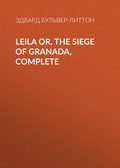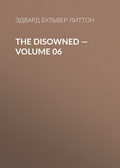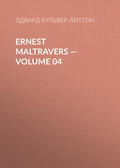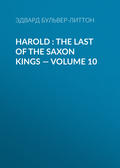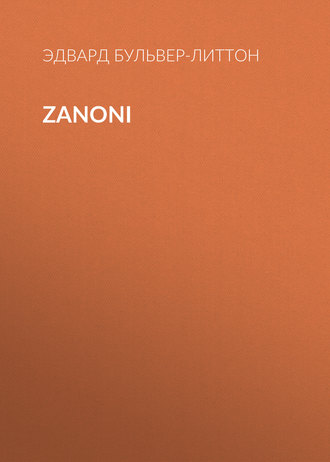
Эдвард Бульвер-Литтон
Zanoni
CHAPTER 4.VII
Cernis, custodia qualis
Vestibulo sedeat? facies quae limina servet?
“Aeneid,” lib. vi. 574.
(See you what porter sits within the vestibule?—what face watches at the threshold?)
And it is profound night. All is at rest within the old castle,—all is breathless under the melancholy stars. Now is the time. Mejnour with his austere wisdom,—Mejnour the enemy to love; Mejnour, whose eye will read thy heart, and refuse thee the promised secrets because the sunny face of Fillide disturbs the lifeless shadow that he calls repose,—Mejnour comes to-morrow! Seize the night! Beware of fear! Never, or this hour! So, brave youth,—brave despite all thy errors,—so, with a steady pulse, thy hand unlocks once more the forbidden door.
He placed his lamp on the table beside the book, which still lay there opened; he turned over the leaves, but could not decipher their meaning till he came to the following passage:—
“When, then, the pupil is thus initiated and prepared, let him open the casement, light the lamps, and bathe his temples with the elixir. He must beware how he presume yet to quaff the volatile and fiery spirit. To taste till repeated inhalations have accustomed the frame gradually to the ecstatic liquid, is to know not life, but death.”
He could penetrate no farther into the instructions; the cipher again changed. He now looked steadily and earnestly round the chamber. The moonlight came quietly through the lattice as his hand opened it, and seemed, as it rested on the floor, and filled the walls, like the presence of some ghostly and mournful Power. He ranged the mystic lamps (nine in number) round the centre of the room, and lighted them one by one. A flame of silvery and azure tints sprung up from each, and lighted the apartment with a calm and yet most dazzling splendour; but presently this light grew more soft and dim, as a thin, grey cloud, like a mist, gradually spread over the room; and an icy thrill shot through the heart of the Englishman, and quickly gathered over him like the coldness of death. Instinctively aware of his danger, he tottered, though with difficulty, for his limbs seemed rigid and stone-like, to the shelf that contained the crystal vials; hastily he inhaled the spirit, and laved his temples with the sparkling liquid. The same sensation of vigour and youth, and joy and airy lightness, that he had felt in the morning, instantaneously replaced the deadly numbness that just before had invaded the citadel of life. He stood, with his arms folded on his bosom erect and dauntless, to watch what should ensue.
The vapour had now assumed almost the thickness and seeming consistency of a snow-cloud; the lamps piercing it like stars. And now he distinctly saw shapes, somewhat resembling in outline those of the human form, gliding slowly and with regular evolutions through the cloud. They appeared bloodless; their bodies were transparent, and contracted or expanded like the folds of a serpent. As they moved in majestic order, he heard a low sound—the ghost, as it were, of voice—which each caught and echoed from the other; a low sound, but musical, which seemed the chant of some unspeakably tranquil joy. None of these apparitions heeded him. His intense longing to accost them, to be of them, to make one of this movement of aerial happiness,—for such it seemed to him,—made him stretch forth his arms and seek to cry aloud, but only an inarticulate whisper passed his lips; and the movement and the music went on the same as if the mortal were not there. Slowly they glided round and aloft, till, in the same majestic order, one after one, they floated through the casement and were lost in the moonlight; then, as his eyes followed them, the casement became darkened with some object undistinguishable at the first gaze, but which sufficed mysteriously to change into ineffable horror the delight he had before experienced. By degrees this object shaped itself to his sight. It was as that of a human head covered with a dark veil through which glared, with livid and demoniac fire, eyes that froze the marrow of his bones. Nothing else of the face was distinguishable,—nothing but those intolerable eyes; but his terror, that even at the first seemed beyond nature to endure, was increased a thousand-fold, when, after a pause, the phantom glided slowly into the chamber.
The cloud retreated from it as it advanced; the bright lamps grew wan, and flickered restlessly as at the breath of its presence. Its form was veiled as the face, but the outline was that of a female; yet it moved not as move even the ghosts that simulate the living. It seemed rather to crawl as some vast misshapen reptile; and pausing, at length it cowered beside the table which held the mystic volume, and again fixed its eyes through the filmy veil on the rash invoker. All fancies, the most grotesque, of monk or painter in the early North, would have failed to give to the visage of imp or fiend that aspect of deadly malignity which spoke to the shuddering nature in those eyes alone. All else so dark,—shrouded, veiled and larva-like. But that burning glare so intense, so livid, yet so living, had in it something that was almost HUMAN in its passion of hate and mockery,—something that served to show that the shadowy Horror was not all a spirit, but partook of matter enough, at least, to make it more deadly and fearful an enemy to material forms. As, clinging with the grasp of agony to the wall,—his hair erect, his eyeballs starting, he still gazed back upon that appalling gaze,—the Image spoke to him: his soul rather than his ear comprehended the words it said.
“Thou hast entered the immeasurable region. I am the Dweller of the Threshold. What wouldst thou with me? Silent? Dost thou fear me? Am I not thy beloved? Is it not for me that thou hast rendered up the delights of thy race? Wouldst thou be wise? Mine is the wisdom of the countless ages. Kiss me, my mortal lover.” And the Horror crawled near and nearer to him; it crept to his side, its breath breathed upon his cheek! With a sharp cry he fell to the earth insensible, and knew no more till, far in the noon of the next day, he opened his eyes and found himself in his bed,—the glorious sun streaming through his lattice, and the bandit Paolo by his side, engaged in polishing his carbine, and whistling a Calabrian love-air.
CHAPTER 4.VIII
Thus man pursues his weary calling,
And wrings the hard life from the sky,
While happiness unseen is falling
Down from God’s bosom silently.
—Schiller.
In one of those islands whose history the imperishable literature and renown of Athens yet invest with melancholy interest, and on which Nature, in whom “there is nothing melancholy,” still bestows a glory of scenery and climate equally radiant for the freeman or the slave,—the Ionian, the Venetian, the Gaul, the Turk, or the restless Briton,—Zanoni had fixed his bridal home. There the air carries with it the perfumes of the plains for miles along the blue, translucent deep. (See Dr. Holland’s “Travels to the Ionian Isles,” etc., page 18.) Seen from one of its green sloping heights, the island he had selected seemed one delicious garden. The towers and turrets of its capital gleaming amidst groves of oranges and lemons; vineyards and olive-woods filling up the valleys, and clambering along the hill-sides; and villa, farm, and cottage covered with luxuriant trellises of dark-green leaves and purple fruit. For there the prodigal beauty yet seems half to justify those graceful superstitions of a creed that, too enamoured of earth, rather brought the deities to man, than raised the man to their less alluring and less voluptuous Olympus.
And still to the fishermen, weaving yet their antique dances on the sand; to the maiden, adorning yet, with many a silver fibula, her glossy tresses under the tree that overshadows her tranquil cot,—the same Great Mother that watched over the wise of Samos, the democracy of Corcyra, the graceful and deep-taught loveliness of Miletus, smiles as graciously as of yore. For the North, philosophy and freedom are essentials to human happiness; in the lands which Aphrodite rose from the waves to govern, as the Seasons, hand in hand, stood to welcome her on the shores, Nature is all sufficient. (Homeric Hymn.)
The isle which Zanoni had selected was one of the loveliest in that divine sea. His abode, at some distance from the city, but near one of the creeks on the shore, belonged to a Venetian, and, though small, had more of elegance than the natives ordinarily cared for. On the seas, and in sight, rode his vessel. His Indians, as before, ministered in mute gravity to the service of the household. No spot could be more beautiful,—no solitude less invaded. To the mysterious knowledge of Zanoni, to the harmless ignorance of Viola, the babbling and garish world of civilised man was alike unheeded. The loving sky and the lovely earth are companions enough to Wisdom and to Ignorance while they love.
Although, as I have before said, there was nothing in the visible occupations of Zanoni that betrayed a cultivator of the occult sciences, his habits were those of a man who remembers or reflects. He loved to roam alone, chiefly at dawn, or at night, when the moon was clear (especially in each month, at its rise and full), miles and miles away over the rich inlands of the island, and to cull herbs and flowers, which he hoarded with jealous care. Sometimes, at the dead of night, Viola would wake by an instinct that told her he was not by her side, and, stretching out her arms, find that the instinct had not deceived her. But she early saw that he was reserved on his peculiar habits; and if at times a chill, a foreboding, a suspicious awe crept over her, she forebore to question him.
But his rambles were not always unaccompanied,—he took pleasure in excursions less solitary. Often, when the sea lay before them like a lake, the barren dreariness of the opposite coast of Cephallenia contrasting the smiling shores on which they dwelt, Viola and himself would pass days in cruising slowly around the coast, or in visits to the neighbouring isles. Every spot of the Greek soil, “that fair Fable-Land,” seemed to him familiar; and as he conversed of the past and its exquisite traditions, he taught Viola to love the race from which have descended the poetry and the wisdom of the world. There was much in Zanoni, as she knew him better, that deepened the fascination in which Viola was from the first enthralled. His love for herself was so tender, so vigilant, and had that best and most enduring attribute, that it seemed rather grateful for the happiness in its own cares than vain of the happiness it created. His habitual mood with all who approached him was calm and gentle, almost to apathy. An angry word never passed his lips,—an angry gleam never shot from his eyes. Once they had been exposed to the danger not uncommon in those then half-savage lands. Some pirates who infested the neighbouring coasts had heard of the arrival of the strangers, and the seamen Zanoni employed had gossiped of their master’s wealth. One night, after Viola had retired to rest, she was awakened by a slight noise below. Zanoni was not by her side; she listened in some alarm. Was that a groan that came upon her ear? She started up, she went to the door; all was still. A footstep now slowly approached, and Zanoni entered calm as usual, and seemed unconscious of her fears.
The next morning three men were found dead at the threshold of the principal entrance, the door of which had been forced. They were recognised in the neighbourhood as the most sanguinary and terrible marauders of the coasts,—men stained with a thousand murders, and who had never hitherto failed in any attempt to which the lust of rapine had impelled them. The footsteps of many others were tracked to the seashore. It seemed that their accomplices must have fled on the death of their leaders. But when the Venetian Proveditore, or authority, of the island, came to examine into the matter, the most unaccountable mystery was the manner in which these ruffians had met their fate. Zanoni had not stirred from the apartment in which he ordinarily pursued his chemical studies. None of the servants had even been disturbed from their slumbers. No marks of human violence were on the bodies of the dead. They died, and made no sign. From that moment Zanoni’s house—nay, the whole vicinity—was sacred. The neighbouring villages, rejoiced to be delivered from a scourge, regarded the stranger as one whom the Pagiana (or Virgin) held under her especial protection.
In truth, the lively Greeks around, facile to all external impressions, and struck with the singular and majestic beauty of the man who knew their language as a native, whose voice often cheered them in their humble sorrows, and whose hand was never closed to their wants, long after he had left their shore preserved his memory by grateful traditions, and still point to the lofty platanus beneath which they had often seen him seated, alone and thoughtful, in the heats of noon. But Zanoni had haunts less open to the gaze than the shade of the platanus. In that isle there are the bituminous springs which Herodotus has commemorated. Often at night, the moon, at least, beheld him emerging from the myrtle and cystus that clothe the hillocks around the marsh that imbeds the pools containing the inflammable materia, all the medical uses of which, as applied to the nerves of organic life, modern science has not yet perhaps explored. Yet more often would he pass his hours in a cavern, by the loneliest part of the beach, where the stalactites seem almost arranged by the hand of art, and which the superstition of the peasants associates, in some ancient legends, with the numerous and almost incessant earthquakes to which the island is so singularly subjected.
Whatever the pursuits that instigated these wanderings and favoured these haunts, either they were linked with, or else subordinate to, one main and master desire, which every fresh day passed in the sweet human company of Viola confirmed and strengthened.
The scene that Glyndon had witnessed in his trance was faithful to truth. And some little time after the date of that night, Viola was dimly aware that an influence, she knew not of what nature, was struggling to establish itself over her happy life. Visions indistinct and beautiful, such as those she had known in her earlier days, but more constant and impressive, began to haunt her night and day when Zanoni was absent, to fade in his presence, and seem less fair than THAT. Zanoni questioned her eagerly and minutely of these visitations, but seemed dissatisfied, and at times perplexed, by her answers.
“Tell me not,” he said, one day, “of those unconnected images, those evolutions of starry shapes in a choral dance, or those delicious melodies that seem to thee of the music and the language of the distant spheres. Has no ONE shape been to thee more distinct and more beautiful than the rest,—no voice uttering, or seeming to utter, thine own tongue, and whispering to thee of strange secrets and solemn knowledge?”
“No; all is confused in these dreams, whether of day or night; and when at the sound of thy footsteps I recover, my memory retains nothing but a vague impression of happiness. How different—how cold—to the rapture of hanging on thy smile, and listening to thy voice, when it says, ‘I love thee!’”
“Yet, how is it that visions less fair than these once seemed to thee so alluring? How is it that they then stirred thy fancies and filled thy heart? Once thou didst desire a fairy-land, and now thou seemest so contented with common life.”
“Have I not explained it to thee before? Is it common life, then, to love, and to live with the one we love? My true fairy-land is won! Speak to me of no other.”
And so night surprised them by the lonely beach; and Zanoni, allured from his sublimer projects, and bending over that tender face, forgot that, in the Harmonious Infinite which spread around, there were other worlds than that one human heart.
CHAPTER 4.IX
There is a principle of the soul, superior to all nature, through which we are capable of surpassing the order and systems of the world. When the soul is elevated to natures better than itself, THEN it is entirely separated from subordinate natures, exchanges this for another life, and, deserting the order of things with which it was connected, links and mingles itself with another.
—Iamblichus.
“Adon-Ai! Adon-Ai!—appear, appear!”
And in the lonely cave, whence once had gone forth the oracles of a heathen god, there emerged from the shadows of fantastic rocks a luminous and gigantic column, glittering and shifting. It resembled the shining but misty spray which, seen afar off, a fountain seems to send up on a starry night. The radiance lit the stalactites, the crags, the arches of the cave, and shed a pale and tremulous splendour on the features of Zanoni.
“Son of Eternal Light,” said the invoker, “thou to whose knowledge, grade after grade, race after race, I attained at last, on the broad Chaldean plains; thou from whom I have drawn so largely of the unutterable knowledge that yet eternity alone can suffice to drain; thou who, congenial with myself, so far as our various beings will permit, hast been for centuries my familiar and my friend,—answer me and counsel!”
From the column there emerged a shape of unimaginable glory. Its face was that of a man in its first youth, but solemn, as with the consciousness of eternity and the tranquillity of wisdom; light, like starbeams, flowed through its transparent veins; light made its limbs themselves, and undulated, in restless sparkles, through the waves of its dazzling hair. With its arms folded on its breast, it stood distant a few feet from Zanoni, and its low voice murmured gently, “My counsels were sweet to thee once; and once, night after night, thy soul could follow my wings through the untroubled splendours of the Infinite. Now thou hast bound thyself back to the earth by its strongest chains, and the attraction to the clay is more potent than the sympathies that drew to thy charms the Dweller of the Starbeam and the Air. When last thy soul hearkened to me, the senses already troubled thine intellect and obscured thy vision. Once again I come to thee; but thy power even to summon me to thy side is fading from thy spirit, as sunshine fades from the wave when the winds drive the cloud between the ocean and the sky.”
“Alas, Adon-Ai!” answered the seer, mournfully, “I know too well the conditions of the being which thy presence was wont to rejoice. I know that our wisdom comes but from the indifference to the things of the world which the wisdom masters. The mirror of the soul cannot reflect both earth and heaven; and the one vanishes from the surface as the other is glassed upon its deeps. But it is not to restore me to that sublime abstraction in which the intellect, free and disembodied, rises, region after region, to the spheres,—that once again, and with the agony and travail of enfeebled power I have called thee to mine aid. I love; and in love I begin to live in the sweet humanities of another. If wise, yet in all which makes danger powerless against myself, or those on whom I can gaze from the calm height of indifferent science, I am blind as the merest mortal to the destinies of the creature that makes my heart beat with the passions which obscure my gaze.”
“What matter!” answered Adon-Ai. “Thy love must be but a mockery of the name; thou canst not love as they do for whom there are death and the grave. A short time,—like a day in thy incalculable life,—and the form thou dotest on is dust! Others of the nether world go hand in hand, each with each, unto the tomb; hand in hand they ascend from the worm to new cycles of existence. For thee, below are ages; for her, but hours. And for her and thee—O poor, but mighty one!—will there be even a joint hereafter! Through what grades and heavens of spiritualised being will her soul have passed when thou, the solitary loiterer, comest from the vapours of the earth to the gates of light!”
“Son of the Starbeam, thinkest thou that this thought is not with me forever; and seest thou not that I have invoked thee to hearken and minister to my design? Readest thou not my desire and dream to raise the conditions of her being to my own? Thou, Adon-Ai, bathing the celestial joy that makes thy life in the oceans of eternal splendour,—thou, save by the sympathies of knowledge, canst conjecture not what I, the offspring of mortals, feel—debarred yet from the objects of the tremendous and sublime ambition that first winged my desires above the clay—when I see myself compelled to stand in this low world alone. I have sought amongst my tribe for comrades, and in vain. At last I have found a mate. The wild bird and the wild beast have theirs; and my mastery over the malignant tribes of terror can banish their larvae from the path that shall lead her upward, till the air of eternity fits the frame for the elixir that baffles death.”
“And thou hast begun the initiation, and thou art foiled! I know it. Thou hast conjured to her sleep the fairest visions; thou hast invoked the loveliest children of the air to murmur their music to her trance, and her soul heeds them not, and, returning to the earth, escapes from their control. Blind one, wherefore? canst thou not perceive? Because in her soul all is love. There is no intermediate passion with which the things thou wouldst charm to her have association and affinities. Their attraction is but to the desires and cravings of the INTELLECT. What have they with the PASSION that is of earth, and the HOPE that goes direct to heaven?”
“But can there be no medium—no link—in which our souls, as our hearts, can be united, and so mine may have influence over her own?”
“Ask me not,—thou wilt not comprehend me!”
“I adjure thee!—speak!”
“When two souls are divided, knowest thou not that a third in which both meet and live is the link between them!”
“I do comprehend thee, Adon-Ai,” said Zanoni, with a light of more human joy upon his face than it had ever before been seen to wear; “and if my destiny, which here is dark to mine eyes, vouchsafes to me the happy lot of the humble,—if ever there be a child that I may clasp to my bosom and call my own—”
“And is it to be man at last, that thou hast aspired to be more than man?”
“But a child,—a second Viola!” murmured Zanoni, scarcely heeding the Son of Light; “a young soul fresh from heaven, that I may rear from the first moment it touches earth,—whose wings I may train to follow mine through the glories of creation; and through whom the mother herself may be led upward over the realm of death!”
“Beware,—reflect! Knowest thou not that thy darkest enemy dwells in the Real? Thy wishes bring thee near and nearer to humanity.”
“Ah, humanity is sweet!” answered Zanoni.
And as the seer spoke, on the glorious face of Adon-Ai there broke a smile.



